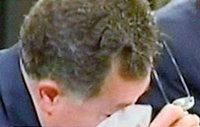
Lebanese nationalism on the rise
A Very Good Piece
By Justin Raimondo
"When Israeli jets were dropping American-made-and-paid-for bombs on Lebanon's cities, where was the Lebanese "army"? Hiding in its barracks, even as the Israelis reduced their bases to rubble. And where was Lebanon's prime minister, Fouad Siniora, and what was he doing about it? He was pleading with his masters in Washington to call off their Israeli dogs, and wiping away tears as he broke down in front of the Arab conference, when it became apparent that his pleas were falling on deaf ears. That isn't all he was doing, however, as Hassan Nasrallah recently pointed out. Addressing 2 million protesters rallying in Beirut against Siniora's government, he asked: "Didn't the prime minister of Lebanon work to cut off the supply lines?" Nasrallah and his supporters claim Lebanese government officials colluded with the Americans and the Israelis to rain death on their own country.
The war in which Hezbollah alone defended the Lebanese nation against the Israelis has given Nasrallah tremendous political authority – and created a nationalist coalition that rises above sectarian divisions. In calling for a new government of national unity dedicated to preserving Lebanese sovereignty, Hezbollah is joined by other mainstream Lebanese political forces, including Amal and the Lebanese Patriotic Front, the Maronite Christian group led by Michel Aoun. The Democratic Party of Lebanon, a Druze group led by Talal Arslan, also supports the anti-government coalition.
The unifying principle that brings together all these disparate elements is opposed not just to the present government, but to what it represents: a conspiracy of foreigners who want to assert – or, in the case of France, reassert – control over Lebanese affairs.......
Now many of the same people who marched against the Syrian-backed regime are demanding an end to Siniora, and the West is paying the price of betrayal. A wave of anti-Americanism is sweeping the country, as Hezbollah speakers at the daily protests in Beirut declare "there is no place for America in Lebanon."
This perfectly illustrates the double treachery of a foreign policy that serves neither American interests nor the interests of freedom abroad. For all the rhetoric about the "global democratic revolution" coming out of the White House propaganda operation, the tragic reality of our actual policy was confirmed by the Israeli aggression, which we not only fully countenanced, but, some say, actively encouraged. America is blamed as much as Israel for an attack that killed over 1,000 Lebanese (hardly any of them Hezbollah fighters) and devastated much of the essential infrastructure that made Lebanon a major commercial hub for the region........
Lebanon's "confessional" constitutional arrangements call for a division of political power according to religious and ethnic allegiances, but the Israeli incursion created something new: a genuine Lebanese nationalism, forged in the fire of war.....
The neocons haven't given up, however: the frame-up of the Syrians over the assassination of Hariri – and, now, Pierre Gemayel – came to a head when the Siniora government approved the UN "tribunal" assigned to find and prosecute Hariri's killers. The Hariri case, however, is so convoluted and complex that I challenge anyone to examine the facts and come up with an unambiguous verdict. In any case, as I have written before, the evidence against the Syrians is far from convincing. Hezbollah and others opposed the government's action for this reason, as well as in defense of Lebanese sovereignty: after all, how would Americans like it if the UN decided to establish a "tribunal" to establish who was behind, say, the assassination of John F. Kennedy?
......Is it too much to hope that the much-touted triumph of "realism" in Washington circles will derail the War Party's plans to take the offensive in Lebanon? Israeli Prime Minister Ehud Olmert doesn't think so, and I'm afraid he's right. Yes, there is a growing rebellion against our Israeli-centric Middle Eastern policy stance, but I'm afraid it doesn't extend to the White House. The power of "the Lobby," as John J. Mearsheimer and Stephen Walt call it, has been increasingly challenged, but is not yet broken. Washington, as Pat Buchanan so trenchantly and colorfully put it, is still "Israeli-occupied territory," and until we liberate our policy from the depredations of Israel Firsters, there is no chance of formulating a foreign policy that serves both American interests and the interests of all the peoples of the region."

No comments:
Post a Comment